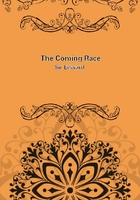
第24章
In the conjugation of their verbs, which is much too lengthy a subject to enter on here, the auxiliary verb Ya, "to go," which plays so considerable part in the Sanskrit, appears and performs a kindred office, as if it were a radical in some language from which both had descended. But another auxiliary 52or opposite signification also accompanies it andshares its labours- viz., Zi, to stay or repose. Thus Ya enters into the future tense, and Zi in the preterite of all verbs requiring auxiliaries. Yam, I shall go- Yiam, I may go- Yani-ya, I shall go (literally, I go to go), Zam- poo-yan, I have gone (literally, I rest from gone). Ya, as a termination, implies by analogy, progress, movement, efflorescence. Zi, as a terminal, denotes fixity, sometimes in a good sense, sometimes in a bad, according to the word with which it is coupled. Iva-zi, eternal goodness; Nan-zi, eternal evil. Poo (from) enters as a prefix to words that denote repugnance, or things from which we ought to be averse. Poo-pra, disgust; Poo-naria, falsehood, the vilest kind of evil. Poosh or Posh I have already confessed to be untranslatable literally. It is an expression of contempt not unmixed with pity. This radical seems to have originated from inherent sympathy between the labial effort and the sentiment that impelled it, Poo being an utterance in which the breath is exploded from the lips with more or less vehemence. On the other hand, Z, when an initial, is with them a sound in which the breath is sucked inward, and thus Zu, pronounced Zoo (which in their language is one letter), is the ordinary prefix to words that signify something that attracts, pleases, touches the heart- as Zummer, lover; Zutze, love; Zuzulia, delight. This indrawn sound of Z seems indeed naturally appropriate to fondness.Thus, even in our language, mothers say to their babies, in defiance of grammar, "Zoo darling;" and I have heard a learned professor at Boston call his wife (he had been only married a month) "Zoo little pet."I cannot quit this subject, however, without observing by what slight changes in the dialects favoured by different tribes of the same race, the original signification and beauty of sounds may become confused and deformed. Zee told me with much indignation that Zummer (lover) which in the way she uttered it, seemed slowly taken down to the very depths of her heart, was, in some not very distant communities of the Vril- ya, 53vitiated into the half-hissing, half-nasal, wholly disagreeable, sound of Subber. I thought to myself it only wanted the introduction of 'n' before 'u' to render it into an English word significant of the last quality an amorous Gy would desire in her Zummer.
I will but mention another peculiarity in this language which givesequal force and brevity to its forms of expressions.
A is with them, as with us, the first letter of the alphabet, and is often used as a prefix word by itself to convey a complex idea of sovereignty or chiefdom, or presiding principle. For instance, Iva is goodness; Diva, goodness and happiness united; A-Diva is unerring and absolute truth. I have already noticed the value of A in A-glauran, so, in vril (to whose properties they trace their present state of civilisation), A-vril, denotes, as I have said, civilisation itself.
The philologist will have seen from the above how much the language of the Vril-ya is akin to the Aryan or Indo-Germanic; but, like all languages, it contains words and forms in which transfers from very opposite sources of speech have been taken. The very title of Tur, which they give to their supreme magistrate, indicates theft from a tongue akin to the Turanian. They say themselves that this is a foreign word borrowed from a title which their historical records show to have been borne by the chief of a nation with whom the ancestors of the Vril-ya were, in very remote periods, on friendly terms, but which has long become extinct, and they say that when, after the discovery of vril, they remodelled their political institutions, they expressly adopted a title taken from an extinct race and a dead language for that of their chief magistrate, in order to avoid all titles for that office with which they had previous associations.
Should life be spared to me, I may collect into systematic form such knowledge as I acquired of this language during my sojourn amongst the Vril-ya. But what I have already said will perhaps suffice to show to genuine philological students that a 54language which, preserving so many of the roots in the aboriginal form, and clearing from the immediate, but transitory, polysynthetical stage so many rude incumbrances, s from popular ignorance into that popular passion or ferocity which precedes its decease, as (to cite illustrations from the upper world) during the French Reign of Terror, or for the fifty years of the Roman Republic preceding the ascendancy of Augustus, their name for that state of things is Glek-Nas. Ek is strife- Glek, the universal strife.Nas, as I before said, is corruption or rot; thus, Glek-Nas may be construed, "the universal strife-rot."Their compounds are very expressive; thuat which the Anahave attained forbids the progressive cultivation of literature, especially in the two main divisions of fiction and history,- I shall have occasion to show later.